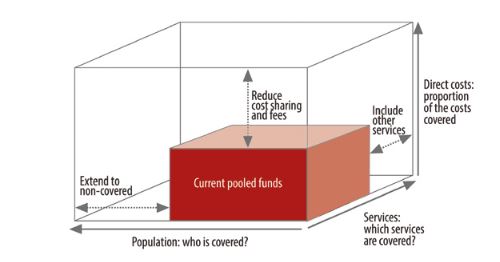
How to move towards universal health coverage in crisis-affected settings: lessons from research
Image: The three dimensions of progress towards UHC
Universal health coverage (UHC) has become one of the leading aspirational features in health policy and research. This is demonstrated by its inclusion as a target in the Sustainable Development Goals: to ‘achieve universal health coverage, including financial risk protection, access to quality essential healthcare services and access to safe, effective, quality and affordable essential medicines and vaccines for all’. This policy brief reviews the meaning of UHC and summarises lessons for achieving UHC in crisis-affected settings.
This brief is one of a series of ReBUILD papers addresses key questions on health systems strengthening in settings affected by conflict or crisis. The purpose of these briefing papers is to bring together current knowledge and research in order to inform decision-makers, implementers, researchers and other stakeholders in this area.
The questions addressed in the series were identified through a study of priority research needs carried out by the Thematic Working Group on Health Systems in Fragile and Conflict Affected States. ReBUILD researchers have drawn on both the programme’s own research and on wider published literature to address eight of the questions through this series of briefing papers.